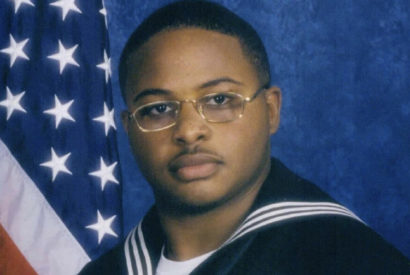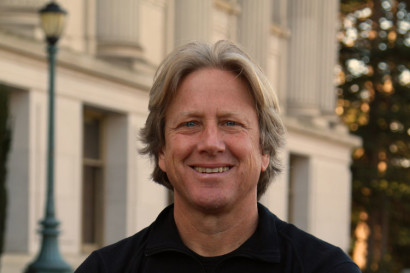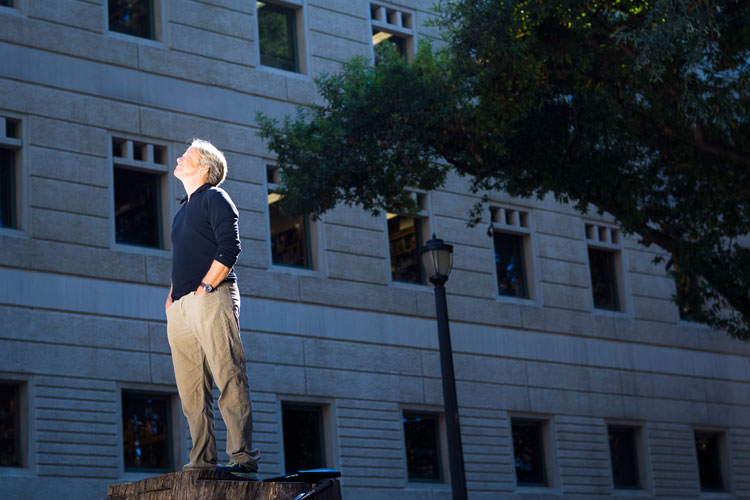Building community one person at a time
For UC Berkeley staffer Tyrone Wise, building community starts with listening: "When we take time to understand what people are saying to us, then we can better understand who they are as people"
February 2, 2021
In a time when our nation is more ideologically divided than ever, it’s crucial that we find ways to come together across differences and find common ground, says UC Berkeley psychology professor Dacher Keltner. But how do we do this?
For staffer Tyrone Wise, it starts with asking tough questions and then listening — really listening — to the answer. “When we take time to understand what people are saying to us,” he says, “then we can better understand who they are as people.”
Wise says that including a range of perspectives when making decisions creates a stronger community — something that he’s working to build at Berkeley.
And a sense of community, says Keltner, which has been lost in our individualistic society, is essential to our survival. By searching for shared values, honoring differences and knowing when to use “tough compassion,” he says, we can begin to build bridges and heal as a nation.

UC Berkeley staffer Tyrone Wise says that including a range of perspectives when making decisions creates a stronger community — something that he’s working to build on campus. (UC Berkeley artwork by Hulda Nelson)
Read a transcript of Fiat Vox episode #68: “Building community one person at a time”
Tyrone Wise: If you’re listening to speak, you’re just waiting for your moment to interject your rebuttal and not really taking time to understand what that person is saying to you. And I think when we take time to understand what people are saying to us, then we can better understand who they are as people.
[Music: “Stucco Grey” by Blue Dot Sessions]

Tyrone Wise is associate director of the full-time MBA Student Experience Program at UC Berkeley’s Haas School of Business. (Photo courtesy of Tyrone Wise)
Tyrone Wise is associate director of the full-time MBA Student Experience Program at UC Berkeley’s Haas School of Business. He’s chair of the Black Staff and Faculty Organization. And he’s co-chair of Berkeley Veterans, a staff organization on campus. He’s also the adviser for the NAACP Youth and College Division at UC Berkeley.
For Black History Month this February, Wise and a team at the Black Staff and Faculty Organization are showing Accidental Courtesy. It’s a 2016 documentary film that follows Daryl Davis, an African American jazz pianist, as he forms friendships with members of the Ku Klux Klan — often through their mutual love of music — and ends up convincing more than 200 Klansmen to leave and denounce the KKK.
Here’s Davis speaking in the film:
Daryl Davis in Accidental Courtesy: I have seen the future. I know what can be done. I know how people can get along. It bothers me that they can’t see that, when there are so many examples. Or they’re not willing to see it. People tend to feel comfortable around things with which they’re familiar. And sometimes they might become xenophobic or develop a fear of things that are different. That fear can be overcome. If they go beyond that fear and develop a hatred, that’s harder to overcome.
Tyrone Wise: One of his main questions is, ‘How can you hate me when you don’t even know me?’
One of the things that was impactful was one of the members was a head of the Baltimore Klan affiliate. And he was also a police officer. And so, when he changed his life and walked away from hate, he gave him (Davis) not only his robe, as his position in the Ku Klux Klan, but he also gave him his police officer jacket. That just shows how ingrained hate and racism and systemic oppression is within our systems and how you never know what people represent during their day job.
But more importantly, it shows how a conversation and just seeing people as people can change your mindset or what you thought you knew.
[Music: “Pastel de Nata” by Blue Dot Sessions]
This is Fiat Vox, a UC Berkeley podcast. I’m Anne Brice.
Wise grew up in the Central Valley of California. After he graduated from high school at 17, he knew he wasn’t ready to live on his own. No one in his family had gone to college, and it was expensive, so it didn’t seem like an option at the time.

After Wise graduated from high school at 17, he joined the Navy. “I traveled the world twice before I turned 21,” he said. (Photo courtesy of Tyrone Wise)
His grandmother had worked for the Army, and he’d heard from her that serving in the military would give him an opportunity to see the world. So, he decided to enlist in the Navy.
Tyrone Wise: I traveled the world twice before I turned 21. It was a great experience. Just being able to see the world not through the lens of America, but through my own lens, was very interesting because I was able to see things that aren’t necessarily represented in our news, in our history and in our culture. It just opened my eyes to see other people in their element.
After serving eight years, Wise left the military and went to college, eventually graduating from University of the Pacific in Stockton with a bachelor’s degree in psychology and a master’s in education administration.
Now at Berkeley, where he’s been on staff for almost two years, he’s leading conversations — about dismantling racism and creating a more equitable campus. They’re conversations that he hopes will help to build a greater sense of community at Berkeley for people who might not always feel like they belong. It’s something that Wise says he’s felt throughout his experience in higher education, both as a veteran and as a person of color.
[Music: “Aourourou” by Blue Dot Sessions]
Feeling a sense of community and belonging is essential to our survival as a species. That’s according to Dacher Keltner, a psychology professor at Berkeley who studies happiness and human emotion.

Dacher Keltner is a psychology professor at UC Berkeley and faculty director of the Greater Good Science Center. (UC Berkeley photo)
Dacher Keltner: We are the most individualistic culture ever. And I think that California even privileges it to a greater extent: freedom, self-expression, identity, individuality. But we have lost a sense of community and shared quality.
I’ve taught The Science of Happiness for 20 years and, you know, it’s such a mystery — what makes us happy, what gives us meaning. And what we can say definitively is that if you want to feel good about life, find social connection. If you’re an introvert, find one person who you really love and who you confide in.
When we feel that sense of connection, it activates the release of oxytocin, dopamine in the brain — the opioids which help you feel really comfortable, the vagus nerve that I study, which regulates your cardiovascular system and your digestion. It’s just good for us, right? And then, when you don’t have those connections, like people in solitary confinement or elsewhere, you suffer profoundly.
Keltner is the faculty director of the Greater Good Science Center at Berkeley, which studies the science of well-being and teaches skills that foster a thriving and compassionate society.
One way to begin to build a sense of community, says Keltner, is by having conversations and figuring out what we have in common with one another — something that the center has been working to do in its program, Bridging Differences.
Dacher Keltner: People have been working hard at this, and as a really collective species, we’re good at this. And, in some sense, everybody knows that one of the worst dimensions of the new technologies — the Twitters and the Facebooks — these are echo chambers and ideological bubbles. So, one thing in terms of expectation is, you know, search for shared values, shared things.
Most people care about their kids. Most people care about the environment. Most people want a better future. Most people want most human beings to live well.
The other thing is to, you know, to honor difference and recognize that democracies are noisy. There is a lot of good research that when you can get opposing partisans to focus on shared values, they do a bit better. When you can get them to figure out ways to appreciate each other’s differences, they do better. And that’s our challenge.

One way to begin to build a sense of community, says Keltner, is by having conversations and figuring out what we have in common with one another — something that the Greater Good Science Center has been working to do in its program, Bridging Differences. (UC Berkeley photo)
Anne Brice: Yeah. Do you think it’s always worth it to try to find something in someone where you connect?
Dacher Keltner: I think it’s hard to find rules that apply to 100% of contexts, you know, but I would say 95% of the time. And importantly, we need to separate institutions from people or informal institutions.
If you went right up to a white supremacist, a Proud Boy, as they were on the Berkeley campus a while ago, and you talk to them over a beer, you’d find some common ground. But you cannot tolerate institutions that harm. And so, we’ve got to do that hard work of separating individuals from the kind of movements that are pernicious.
It’s interesting, because people often associate the Greater Good Science Center and my work with: ‘Always be compassionate, accept everybody.’ And in the deeper traditions of compassion, like a lot of the Buddhist traditions, they have an idea of tough compassion — to step in and, in a good way, guide the person to a different form of behavior or out. But I think most of the time it’s good to connect.
[Music: “Fern and Andy” by Blue Dot Sessions]
In his work on building community on campus, Wise says he tries to include a wide range of perspectives and to make decisions where everyone feels heard.
Tyrone Wise: We all bring an experience and a leadership and a knowledge base that we can put all together and create something amazing.
I definitely want to acknowledge and lift up Chancellor Christ and all her work being part of the BSFO and the Coalition of Ethnic Staff Organizations. We have meetings with the chancellor often, and we talk about this very topic. Her leadership has been instrumental in helping us create changes and create opportunities for growth that allow us to be a more equitable campus.
And so, from the top down, I can say that there are people who are willing to be in the fight with us. I think an exciting part of this role is that we’re able to have these conversations and be heard with the intent to make change.
Wise says that by asking tough questions and truly listening to the answers, like Davis does in Accidental Courtesy, we can bring about meaningful change in our society, building community one person at a time.
For Berkeley News, I’m Anne Brice.
You can subscribe to Fiat Vox, spelled F-I-A-T V-O-X, and give us a rating, wherever you listen to your podcasts. Artwork for this episode was by Hulda Nelson. If you enjoyed this episode, consider sharing it with a friend.
We also have another podcast, Berkeley Talks, which brings you lectures and conversations at UC Berkeley. Find all of our podcast episodes on Berkeley News at news.berkeley.edu/podcasts.
An online screening of Accidental Courtesy, followed by a Q&A session with Davis, will be shown on Wednesday, Feb. 10 at 4:30 p.m. Register for the screening and find more virtual events for Black History Month.
Listen to other Fiat Vox episodes: